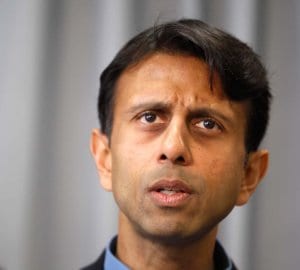By Nicholas Sheppard –
It’s a growing trend in the age of social media — quirky and awkward moments involving politicians and public figures that go viral, piercing the monotony of carefully scripted public appearances and exposing the best efforts of spin doctors and image-conscious, risk-averse politicians.
We get a strange, silly buzz from quirky little incidents; from seeing the rigorously contextualised slip weirdly out of context, especially if it occurs during prime-time.
If a prop tumbles over or doesn’t work during a play, the audience will snicker and giggle. Its a collective impulse – the audience briefly relishes becoming aware of itself.
After President Obama’s first State of the Union address, there was something almost as interesting to political junkies and the internet: the response from the Louisiana Governor Bobby Jindal.
What was meant to be a coming out celebration on the national stage, turned out to be something far different for Jindal: The governors effort was almost universally panned. Following Jindal’s speech, people took to social media to proclaim the similarity between Jindal and Kenneth The Page from the NBC sitcom “30 Rock.” Shortly after, “Kenneth” responded, saying Jindal “sounds like a real goober…natorial representative.”
We love the spontaneous birth of some new catchphrase, or quirky concept, and relish the idea of it emerging from an unlikely setting – especially if its a distinguished one.
During the first of the 2012 presidential debates, Mitt Romney said to moderator Jim Lehrer: “I’m sorry Jim. I’m gonna stop the subsidy to PBS. I’m gonna stop other things. I like PBS, I like Big Bird, I actually like you too.” At that point, someone in the Twitterverse responded by creating a Big Bird account which soon had tens of thousands of followers.
During the second debate, when Romney stated that he’d asked his staff for ‘binders full of women’, image macros captioned with Romney’s “binder” response began circulating on Twitter. Amazon users began writing parody reviews of various binder products. These reviews ranged from men complaining about the lack of women in their binders, to women raving about the durability of the binder in which she was filed.
Last year, as Marco Rubio gave the Republican response to President Obama’s State of the Union address, most viewers took one thing away. Rubio perspired under the hot television lights, repeatedly wiped his dry mouth and was eventually forced to reach out of the camera shot to grab a small bottle of Poland Spring mineral water in order to ease his thirst. What was so funny about the not-so-smooth slug was that Rubio tried to maintain eye contact with the camera as he reached for the mini-bottle. Shortly after, “Rubio water” was in fact trending higher on social media than President Obama’s address.
In the midst of running for mayor of New York, Anthony Weiner faced the media about new revelations, his long-suffering wife Huma dutifully at his side. The mayoral candidate and his sexting pseudonym, Carlos Danger, weren’t the only things trending on social media during Weiner’s mea culpa. A mystery man who emerged from a cubicle behind Weiner during the press conference quickly became a sensation on Twitter as ‘Cubicle guy’. A typical Twitter response: ‘The guy behind the cubicle at this press conference is cracking me up for some reason. He’s Wilson from Home Improvement’.
Recently, as the president was talking to the press, outlining his approach to ISIL and fielding questions about geo-politics in general. the Twittersphere lit up about the fact he was wearing a tan suit. The outfit quickly had it’s own parody account with the handle of @BarackTanSuit, and there were the inevitable puns, such as: ‘the audacity of taupe’.
In May, Press Secretary Jay Carney stepped down. After delivering some remarks in front of the press core, Obama moved in to give Carney a handshake, or a hug, and the two entered into an awkward hybrid grip. Jay Carney did his best to make the hug as awkward as possible, by grabbing the president’s elbow. Needless to say, social media sprung into action. Buzzfeed did a stunningly comprehensive visual breakdown of the embrace, categorizing each developing facet in slow motion, in seven segments. Observed Huffington Post: Jay Carney’s send off was capped by a mega-awkward hug…There was…elbow-on-upper-arm action, maybe? Did Carney kiss Obama’s arm? Does this pair know what hugs are?’
After so many years of dysfunction, of a lack of legislative follow-through, and of potential candidates doing the same old dance of pretending they’re only thinking about running, it may be that we’re just not that into the set-piece political theater anymore. We’re too familiar with the choreography.
Perhaps, at some level, this kind of thing is a way for people to feel a sense of camaraderie – it makes us feel good to know that masses of other people, on social media, have the same facetious element in their character, and are chatting about the same inconsequential glitches – to such an extent that they become, in an odd and often enduring way – consequential.
Republished with permission from The Sheppard Post.














